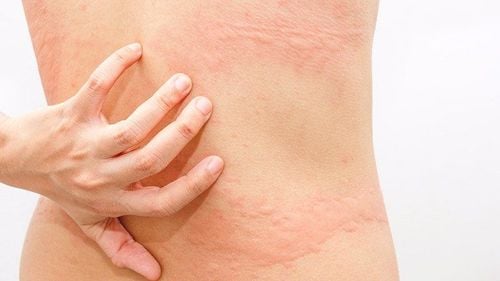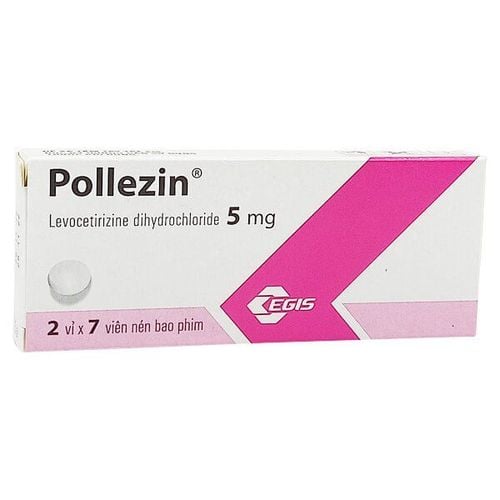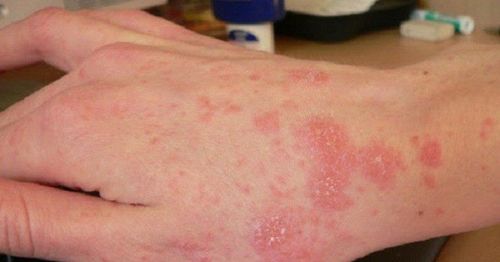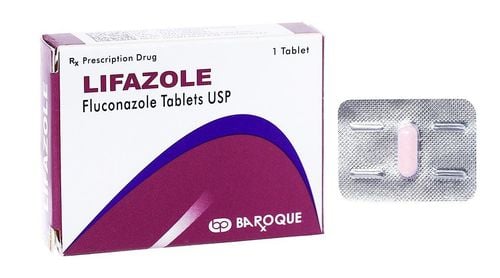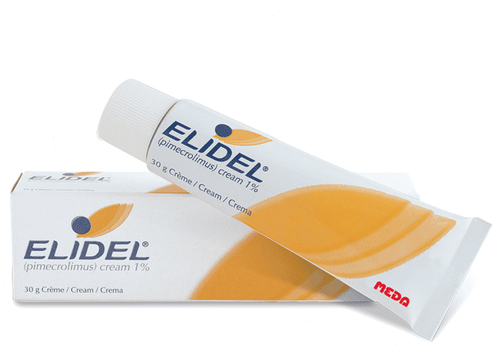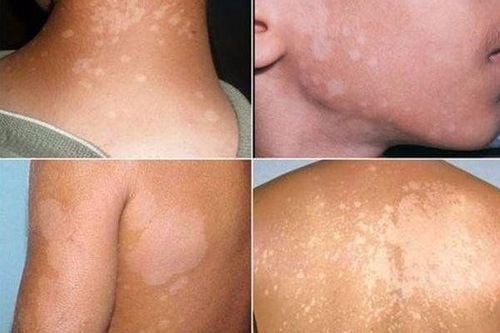This is an automatically translated article.
Itchy papules, urticaria during pregnancy and postpartum are quite common skin diseases in many pregnant women and women. The treatment of the disease must be especially careful to avoid adversely affecting the health of both mother and baby.1. Urticaria during pregnancy – Causes, symptoms
1.1. What is hives during pregnancy? Itchy papules and urticaria, which occur in 0.25-1% of pregnant women, are benign rashes with small, pink, raised papules over stretch marks. These nodules aggregate like hives. Urticaria mainly appears in the abdomen, especially the navel area, then gradually spreads to other areas such as thighs, arms, legs, ... The disease is common in the first 3 months or the last 3 months of pregnancy.
Nổi mề đay trong quá trình mang thai là bệnh về da khá phổi biến
1.2. Causes of Urticaria in Pregnancy Hormonal changes: Placental hormone production, stimulation or alterations in clearance may increase plasma concentrations of estrogen, progesterone, and many androgens. This changes the hair, hair and nail system due to estrogen, androgen, thyroid hormone, prolactin and glucocorticoid, increases the stimulation of melanocytes, increases proopiomelanocortin production, easily causes urticaria, skin rash Due to the use of functional foods: The enhancement of calcium, tonic, iron, vaccination, ... during pregnancy can cause urticaria Exposure to allergens: Insects, smoke, dust , pollen, animal hair, chemicals,... easily irritating, hives on the skin, also known as allergic urticaria Food consumption: Improper nutrition, excess substances, special especially consuming a lot of foods that cause allergies such as peanuts, seafood, almonds, ... can cause hives Other causes: Change in weather, weak resistance, prone to allergies hereditary,...
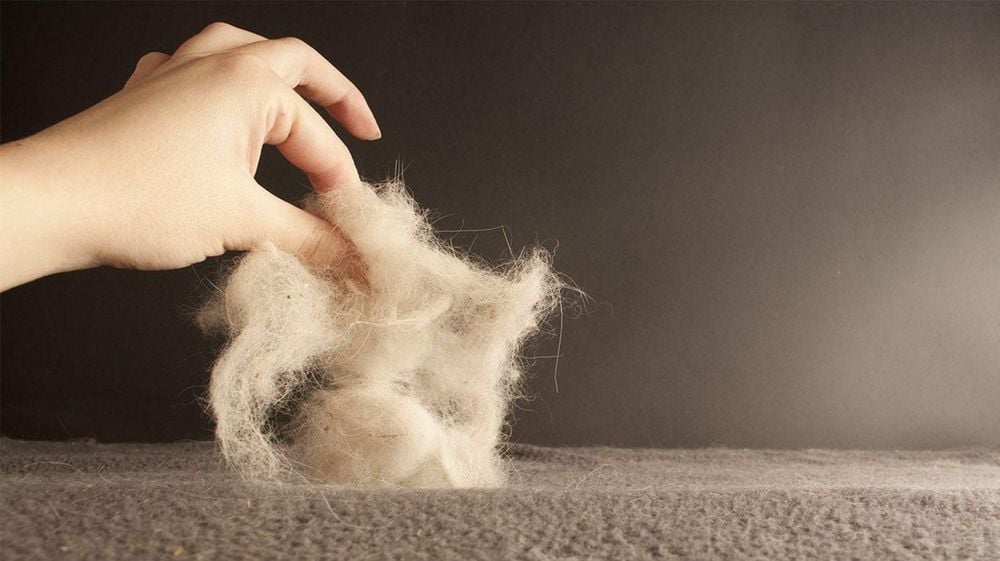
Đối với người bị dị ứng bởi lông động vật dễ gây kích ứng, nổi mề đay
1.3. Symptoms of urticaria during pregnancy Symptoms of pruritus urticaria usually appear in the last 3 months of pregnancy and usually disappear after delivery. Common symptoms are:
Red rash concentrated in one location or scattered throughout the body, common in the touch area, stretch marks, buttocks, thighs, face, arms,...; Itching causes scratching reaction, aggravates the disease, spreading rash, forming plaques, scratching a lot can cause skin abrasions and skin infections; If the disease is left untreated for a long time, it will recur continuously, turn into a chronic stage, and have additional symptoms such as headache, fever, fatigue, sore throat, shortness of breath, a lot of discharge, ...
Trắc nghiệm: Tại sao khi mang thai có người rạn da, người thì không?
Hầu như mẹ bầu nào cũng sẽ bị rạn da khi mang thai, nhưng một số lại không gặp tình trạng này. Vậy nguyên nhân là do đâu? Làm bài trắc nghiệm sau sẽ giúp bạn giải đáp thắc mắc này.1.4. Is hives during pregnancy dangerous? It is very difficult to determine the cause of urticaria during pregnancy through external manifestations without visiting a reputable hospital. There are cases that do not affect pregnant women and fetuses. However, there are also cases of urticaria that warn of many dangerous diseases such as cholestasis in the liver (poor bile circulation), putting pregnant women at risk of premature birth and postpartum anemia. In addition, urticaria in the genital organs can cause inflammation inside the uterus through the placenta, increasing the risk of miscarriage, growth retardation, cleft palate, affecting the respiratory system, etc. Congenital anemia, premature birth,...
Therefore, pregnant women with allergies and hives need to go to reputable hospitals to be consulted by a doctor for safe and effective treatment methods.
2. Postpartum urticaria – Causes, symptoms

Sản phụ sinh mổ dễ có nguy cơ nổi mề đay sau sinh
2.2. Causes of postpartum urticaria According to obstetricians, the phenomenon of pregnant women with postpartum urticaria mainly comes from the following causes:
Hormonal changes in women after childbirth: Leading to confusion Endocrine disorders, affecting the body's immune system, reducing the body's ability to fight allergens, leading to itchy papules, urticaria Change in eating and living habits: Dieting combined with having to often stay up late to take care of children causes the mother to lose the balance of nutrients in the body, leading to external manifestations such as rashes, urticaria, anemia Liver anemia: Poor maternal health , lack of nutrients or indigestion causes liver anemia so the body cannot eliminate all toxins, causing rashes, urticaria to appear Drug use: The mother uses anti-inflammatory drugs, serums or vaccines Unreasonable also causes urticaria after birth Other causes: Due to insect bites such as mosquitoes, ants, ...
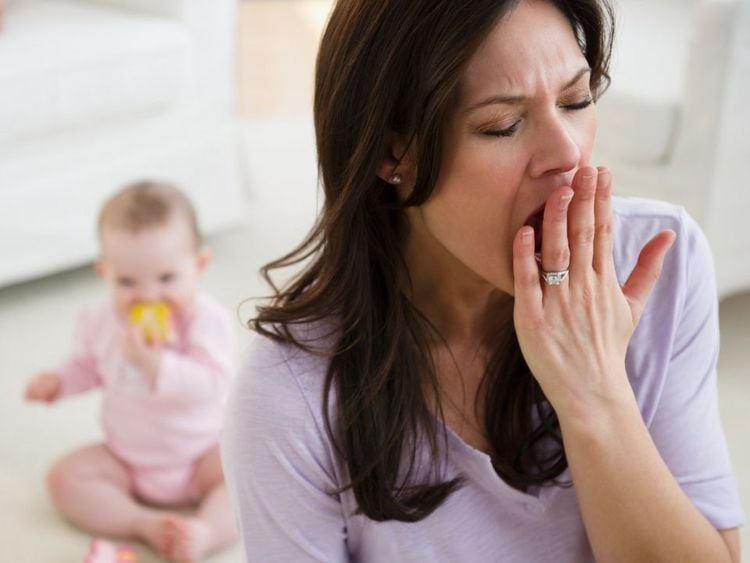
Thường xuyên thức khuya chăm con người mẹ bị mất cân bằng dưỡng chất trong cơ thể dẫn đến hiện tượng nổi mề đay
Skin papules: The first primary lesion that appears, can occur in any area of the skin on bodies of different sizes. Often the papules will be raised above the surface of the skin, pink or lighter in color than the surrounding skin; Angioedema: Only occurs in some locations such as eyelids, lips, external genitals, causing a sudden red rash, papules and swelling of the whole area. Pregnant women may experience other symptoms such as abdominal pain, loose stools, shortness of breath, low blood pressure, anaphylaxis (dangerous symptoms, needing immediate emergency care); Itching: Most cases of urticaria are uncomfortable itching, the more you scratch the more itchiness and the more papules appear. Itching occurs more at night.
3. Treatment of urticaria during pregnancy and postpartum
3.1. Change eating and living habits Measures to reduce itching and discomfort when having urticaria:
Soak in water mixed with oatmeal or green tea Apply cold to the urticaria areas Apply aloe vera gel to the area urticaria area after bathing Wear soft cotton clothes Avoid using shower gels with strong odors or strong chemicals Do not use deodorants Maintain personal hygiene, bathe every day Have a balanced diet, science: Add fruit juice, eat more green vegetables, fresh fruit; Limit allergens such as seafood, stimulants such as alcohol, coffee, ...

Chườm lạnh lên các khu vực nổi mề đay
3.2. Applying folk therapies In folk there are a number of ways to treat urticaria during pregnancy and postpartum with herbal ingredients, helping to clear heat and detoxify such as:
Using herbal tea: Herbal teas such as chrysanthemum tea, white tea, artichoke tea, ... have the effect of protecting the bar, supporting the purification of the body, eliminating toxins from the body, thereby helping to treat rashes effectively. Especially, for women after giving birth, herbal tea also has a positive effect on fat metabolism, helping women get back in shape soon. The substance has soldering properties, helps to warm the body and quickly relieves the symptoms of urticaria during pregnancy and after giving birth. To cure urticaria, women just need to hot roast the leaves and stems of marjoram with salt until golden, then pour it into a towel, apply it directly to the area of the skin with itching, hives. Repeat several times until the itching is gone. In addition, pregnant women and women can use marjoram water to steam. With this method, women wash a handful of marjoram leaves, cook with 2 liters of water, when the water boils, cover them with a blanket, steam for about 15 minutes to soothe the itch and gradually flatten the red spots. Use bitter melon: Helps clear heat, detoxify, cool the body, kill bacteria, fight viruses. To treat rashes and urticaria with bitter melon, women should chop bitter melon, boil it with water for about 10 minutes, then add a little salt. When the water is warm, use it to bathe or wash the skin with urticaria, use bitter melon pulp directly on the skin, do it every 2 days to achieve good results. In addition, pregnant women and pregnant women can also add bitter melon to the daily menu to cool down the body. However, bitter melon is not good for people with stomach, liver and kidney diseases, so users need to be careful

Điều trị nổi mề đay bằng mướp đắng
Use star fruit leaves: Star fruit leaves have temperate properties, help disperse toxic heat, used to treat sores, itching and boils. To treat rashes and urticaria, you can pick a handful of star fruit leaves, wash them and cook them with 3 liters of water, warm them and use them to bathe. After bathing with star fruit water, women take a bath with clean water to soothe the itch. Performing this therapy continuously for 2-3 days will help reduce itching, urticaria Drink lots of water: Actively drink filtered water, green tea water, lemon juice to detoxify and purify the body, reduce itching. 3.3. Drug treatment During pregnancy and lactation, women need to minimize the use of drugs. The drugs used must have low potency, be benign, and not penetrate into the blood or milk to avoid negative effects on the fetus as well as the nursing baby. Specifically:
Use some antihistamines for pregnant and lactating women such as Chlorpheniramine, Cetirizine, Diphenhydramine, Loratadine,... Use topical steroid creams or ointments Severe cases of itching can be used. oral steroids.

Nên sử dụng thuốc theo chi định của bác sĩ chuyên môn
The treatment of urticaria with drugs should strictly follow the indications and follow-up of a dermatologist, obstetrician-gynecologist. Pregnant women and pregnant women absolutely must not buy topical drugs or oral drugs on their own to avoid adversely affecting the health of mother and baby.
The body of pregnant and postpartum women is very sensitive, prone to rashes and hives. In particular, the treatment of the disease can directly affect the health of the mother and the baby, so it needs to be done carefully. Therefore, when there are symptoms of urticaria, it is best for the patient to go to a reputable hospital as soon as possible.
Vinmec Times City International General Hospital with a team of highly qualified and experienced dermatology specialists, along with a system of modern medical equipment, will help diagnose the exact cause of the disease. and have a positive and effective treatment plan, reduce uncomfortable symptoms, minimize the risk of complications for the patient.
Please dial HOTLINE for more information or register for an appointment HERE. Download MyVinmec app to make appointments faster and to manage your bookings easily.




